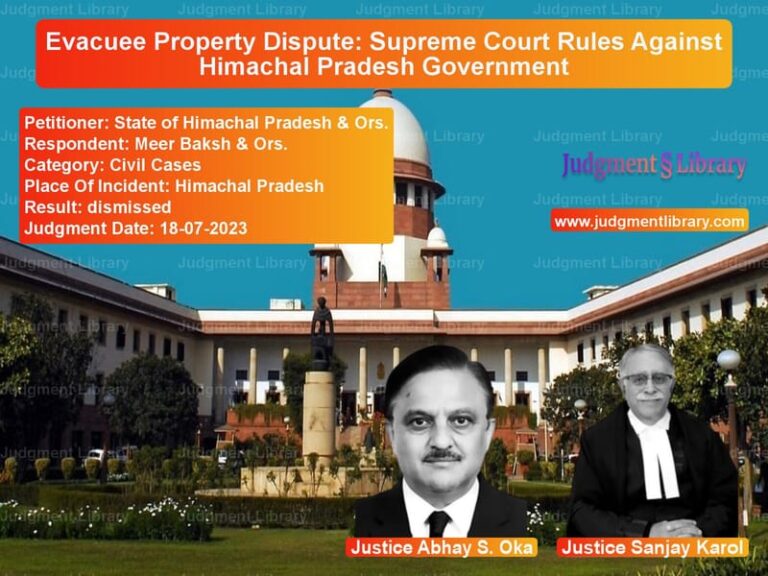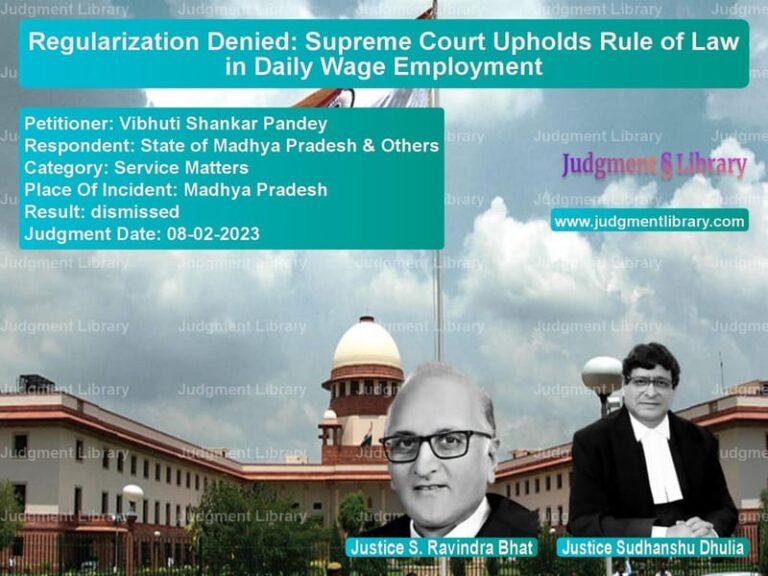Supreme Court Upholds Termination of Temporary Employee: Jagpal Singh vs. State of U.P.
The Supreme Court of India recently ruled in the case of Jagpal Singh vs. State of Uttar Pradesh & Ors., affirming the termination of a temporary employee and setting aside his promotion. The judgment, delivered by Abhay S. Oka and Pankaj Mithal, upheld the Division Bench’s decision to reject the petitioner’s claim for reinstatement, emphasizing the legal principle that an interim order cannot grant permanence to an employee’s service.
This ruling is significant in the field of public employment law as it reiterates the legal stance that temporary employees cannot claim permanent status merely due to long service under an interim order. The judgment also sheds light on the hierarchy of judicial intervention in service matters, demonstrating how finality in termination decisions must be respected.
Background of the Case
The case revolved around the employment of Jagpal Singh, who was appointed as a temporary Collection Peon in Uttar Pradesh. His services were terminated on November 30, 1998, following the terms of his appointment letter, which specified that he was a temporary employee and could be removed without notice. However, due to a prolonged legal battle and interim orders, he continued to work for over two decades, leading to complexities regarding his employment status.
Chronology of Events
- February 1, 1996: Jagpal Singh was appointed as a temporary Collection Peon.
- November 30, 1998: His services were terminated with one month’s salary and allowances.
- 1998: He challenged his termination through Writ Petition No. 42216 of 1998, which was dismissed.
- 1999: Filed a Special Appeal (No. 740 of 1999) and obtained an interim stay on termination.
- 2009: While working under the interim stay, he was promoted to Collection Amin.
- 2009: The Special Appeal was dismissed in default.
- 2011: The Special Appeal was restored but later withdrawn by the petitioner.
- 2011: The Sub-Divisional Magistrate issued an order confirming that the petitioner’s service had been terminated and, therefore, his promotion was invalid.
- 2011: Filed Writ Petition No. 25718 of 2011 challenging the termination, which was allowed by a Single Judge.
- 2017: The Division Bench overturned the Single Judge’s ruling, affirming that the termination order was final.
- 2023: The Supreme Court dismissed the Special Leave Petition.
Petitioner’s Arguments
The petitioner, represented by Senior Counsel Parthiv K. Goswami, contended:
- He had worked continuously for over 20 years, despite the original termination order.
- The government had taken a conscious decision to promote him, indicating that his service had been regularized.
- The termination order should have been reconsidered when granting the promotion.
- His continued service under the interim order indicated that his work was needed and appreciated by the administration.
- The termination order was unjust and arbitrary, disregarding his long service.
Respondent’s Arguments
The State of Uttar Pradesh, represented by Tanmaya Agarwal, countered:
- The petitioner was working solely due to an interim stay and had no legal right to the job.
- His termination order was final and never overturned by any court.
- The promotion was invalid because he was not legally in service at the time.
- Continuing in employment due to an interim order does not equate to permanent absorption.
- The petitioner was not eligible for promotion because his employment itself had legally ended in 1998.
Supreme Court’s Analysis
The Supreme Court held that the petitioner’s service was legally terminated in 1998 and had attained finality. The Court emphasized:
“The termination order of 30.11.1998 was never set aside and, therefore, the petitioner’s claim for reinstatement has no legal foundation.”
1. Effect of Interim Orders
The Court ruled that working under an interim order does not create a legal right to permanent employment:
“The petitioner continued to work only due to an interim stay, which does not override the original termination order.”
2. Validity of Promotion
The Court held that since the petitioner was not legally in service, his promotion was invalid:
“Promotion based on an interim order falls to the ground once the termination order is upheld.”
3. No Right to Regularization
The Court reiterated that temporary employment does not create a right to permanent service:
“A temporary employee has no vested right to claim regularization unless backed by statutory provisions.”
Final Verdict
The Supreme Court ruled:
- The Special Leave Petition was dismissed.
- The termination order of 1998 remained valid and final.
- The promotion was set aside as it had no legal effect.
- The respondents were directed not to recover any salary already paid to the petitioner.
This ruling reinforces that an interim stay does not confer permanent employment rights and that temporary employees cannot claim regularization merely by virtue of prolonged service.
Petitioner Name: Jagpal Singh.Respondent Name: State of Uttar Pradesh & Ors..Judgment By: Justice Abhay S. Oka, Justice Pankaj Mithal.Place Of Incident: Etawah, Uttar Pradesh.Judgment Date: 29-08-2023.
Don’t miss out on the full details! Download the complete judgment in PDF format below and gain valuable insights instantly!
Download Judgment: jagpal-singh-vs-state-of-uttar-prade-supreme-court-of-india-judgment-dated-29-08-2023.pdf
Directly Download Judgment: Directly download this Judgment
See all petitions in Employment Disputes
See all petitions in Termination Cases
See all petitions in Judgment by Abhay S. Oka
See all petitions in Judgment by Pankaj Mithal
See all petitions in dismissed
See all petitions in supreme court of India judgments August 2023
See all petitions in 2023 judgments
See all posts in Service Matters Category
See all allowed petitions in Service Matters Category
See all Dismissed petitions in Service Matters Category
See all partially allowed petitions in Service Matters Category







